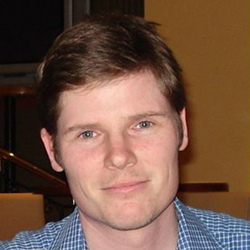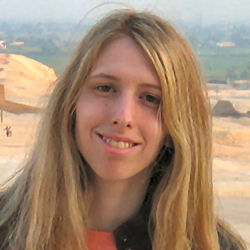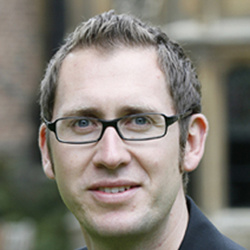Dr James Dawson
Dr James Dawson in the Energy, Fluid Mechanics, and Turbomachinery Division of the Department has been awarded an EPSRC Advanced Research Fellowship. The EPSRC offers up to 50 Advanced Research Fellowships annually to outstanding researchers across its whole remit. Fellows devote themselves to research for the period of the award (in James' case five years), with the expectation that they will have established an independent research career of international standing by the end of their award. These are highly prestigious awards open to both outstanding new researchers and those already established in research careers.
The title of James' EPSRC Fellowship is: "Enhanced mixing by vortex dynamics". Describing his research he says: "Considerable media attention has recently been given to the growth of air travel and its environmental impact. The Future of Transport white paper points out that air travel has increased five-fold over the last 30 years and is expected to triple over the next 30 years.
"The fellowship has been awarded to investigate new mixing enhancement techniques for the next generation of low-emission gas turbine combustors. The success of low-emission technology, often referred to as 'lean-burn', hinges on our technical ability to control the rate and uniformity of fuel-air mixing in order to lower flame temperatures and minimise emissions. Mixing is normally achieved at a rate determined by the turbulence of the flow, however faster mixing over very short distances is needed. A possible solution for this is to locally introduce vortices to augment turbulent mixing and droplet dispersion. Recent developments in high-speed laser diagnostic techniques will be used to conduct fundamental studies into how vortices can benefit the mixing process and provide both a framework for model development and aid in a technological step-change."
Katherine Heller
Katherine Heller who has recently joined the Information Engineering Division of the Department has been awarded an EPSRC Post Doctoral Research Fellowship in Theoretical Computer Science.
The title of Katherine's EPSRC Fellowship is: "Beyond Clustering: Unsupervised Modeling with Complex Representations" Describing her research she says: "The field I work in, Machine Learning, strives to develop new theory and algorithms that improve the ability of computers to recognize patterns, make autonomous decisions, and make predictions based on data. Clustering is an important unsupervised Machine Learning tool for a variety of problems. Automated clustering tools have been used to cluster gene expression data in order to elucidate gene function, automatically group news articles on the web by topic, and spatio-temporally cluster climate data to improve climate prediction.
"While clustering is a wonderful tool for many applications, it is actually quite limited. In many situations the data being modeled can have a much richer and more complex hidden representation than the simple assignment of each data point to a cluster. For example, the data being modeled might have multiple latent features (like images which can contain multiple objects). Moreover, the total number of latent features might not be known, and therefore should not be specified or limited a priori. This flexibility is provided by the use of nonparametric Bayesian methods, which will play a fundamental role in my work. My main goal is to advance the state-of-the-art for unsupervised machine learning, by developing principled, theoretically sound, probabilistic models and algorithms, which extend a clustering paradigm to problems which need richer representations. "
For further details please visit Katherine's webpages.
Dr. Stephan Hofmann
Dr. Stephan Hofmann, in the Electrical Engineering Division of the Department, has recently been awarded a Royal Society Dorothy Hodgkin Research Fellow by The Royal Society. The Dorothy Hodgkin Fellowship scheme supports excellent scientists and engineers at an early stage of their career.
Describing his research he says: "Today, nanoscience and technologies attract a global investment in excess of € 5 billion and are becoming a central interdisciplinary research area with diverse applications, e.g. drug development, water decontamination, information and communication technologies and the production of stronger and lighter materials. The trend of miniaturisation reflects the growing demands of information technology (IT), helping people around the world to share an ever increasing amount of written word, images and sound.
"Accurate downsizing of bulk materials or thin films into the nanometrescale, referred to as the 'top-down' approach, to date remains challenging and costly. My project proposes to chemically synthesise nanostructures that intrinsically provide the desired optical and electronic properties, and assemble them into novel optical device architectures. A major challenge of such a 'bottom-up' approach, and a fact that never fails to fascinate me, is the size-scale of operation. Some structures are the size of a DNA strand. Using these structures, this whole text could be written on a human hair. I am excited about integrating light sources with dimensions smaller than the wavelength they emit. Subwavelength photonics will allow optical communication to share the logic of miniaturisation that revolutionised electronics before.
For further details please visit Stephan's webpages.




